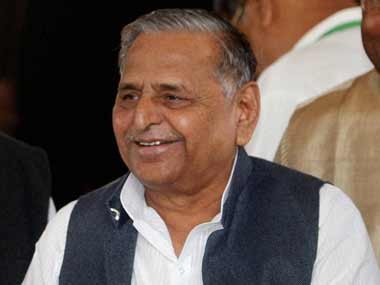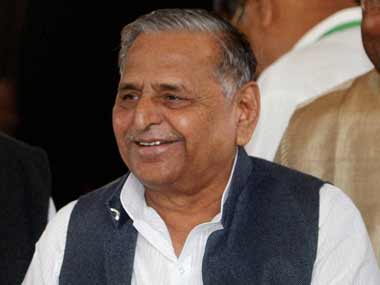Mulayam Singh Yadav is well versed in the sport of wrestling. He is equally proficient in the game of politics. He practices his politics with the mind of a wrestler, looking for every opportunity to score a point. His announcement that the suspension and charge-sheeting of IAS officer Durga Shakti Nagpal was “correct and final” was an exercise in point scoring – with his constituencies and with the Congress, his sparring ally. Few can accuse Yadav of indecision. His party has always believed in action (even the boundary between action and Goondaism is blurred) rather than armchair ideation. [caption id=“attachment_1014361” align=“alignleft” width=“380”]  Mulayam Singh Yadav. PTI[/caption] Mulayam has however — inadvertently perhaps — sowed the seeds of a dangerous idea in the Indian polity: As long as you have MP’s that can determine the fate of a Government, the law of the land means little. Of course, political blackmail is not the invention of the Samajwadi Party or its founder. It’s as old as coalition politics in India. But Mulayam is now testing the ‘unprinciple’ to its extreme. It is not uncommon for smaller parties that support a larger national party at the Centre to demand their pound of flesh. Often, this means giving extra financial resources to a state ruled by a small coalition partner at the expense of equity with the rest of the states in the country. Sometimes, this means vetoing of policy measures — Mamata Banerjee’s 19 MPs enabled her to overrule UPA’s inclination to introduce FDI in retail for several months. Occasionally, it can lead to a fall of government, if the national party refuse sto succumb to blackmail – Vajpayee’s Government lost a vote of confidence in 1999 by one vote after Jayalalitha threw a tantrum. In each of these cases, it is possible to make value judgments about the way small parties behave, punching above their weight – but in no case is any law of the land being broken. In the case of Durga Shakti Nagpal, the Samajwadi Party is victimising a young IAS officer for doing what is right by completing circumventing due process. Nagpal belongs to the IAS, and not the state civil service. The Centre has the authority to intervene, but Mulayam has 23 MPs on which the survival of the UPA, and passage of several crucial legislations, depends. He is effectively blackmailing the Congress into turning a blind eye to wrongdoing. The Congress must take its share of the blame. It hasn’t hesitated to use political blackmail against Mulayam by alternately speeding up and slowing down the CBI cases against him depending on the degree of his support. Nagpal is an excuse for Mulayam to payback the Congress in its own currency. That the Congress is succumbing to Mulayam’s blackmail when it has only 9 months left in office only shows how wedded the grand old party is to power, principles be damned. Congress President Sonia Gandhi thought she could play good cop by writing a letter to the PM asking him to protect the interests of the suspended IAS officer. Mulayam wrestled the intervention into the ground. The danger is that such blackmail will not end with the case of Durga Shakti Nagpal and Mulayam Singh Yadav. It has set a precedence which will almost certainly be exploited by a future coalition partner of a national party. The destruction of even a semblance of institutional propriety will eventually lead to an implosion of the system of Government.
Mulayam has however — inadvertently perhaps — sowed the seeds of a dangerous idea in the Indian polity: As long as you have MP’s that can determine the fate of a Government, the law of the land means little.
Advertisement
End of Article


)
)
)
)
)
)
)
)
)



